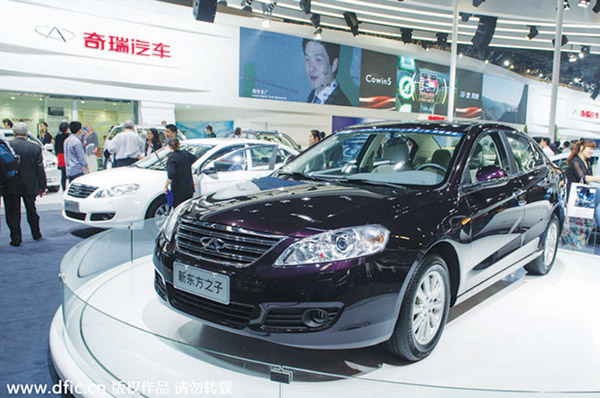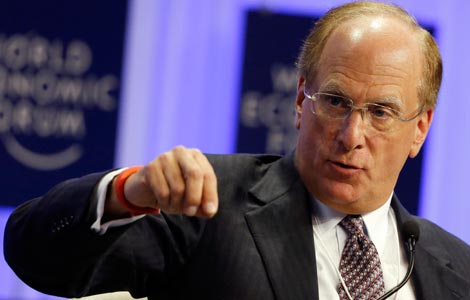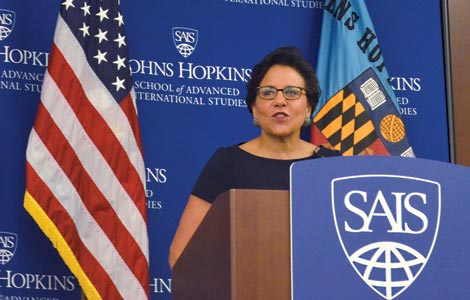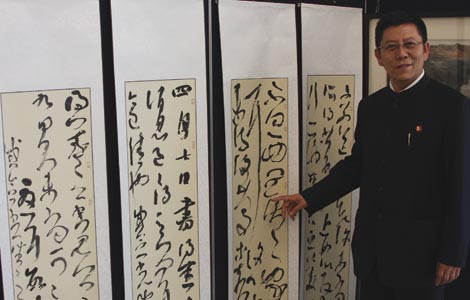Factory plan reflects China's Brazil foothold
Updated: 2014-04-21 04:32
By MICHAEL BARRIS in New York (China Daily Latin America)
|
||||||||
Chery Automobile Co's plan to build a passenger-car assembly plant in Brazil reflects Chinese automakers' optimism that they can crack a formidable marketplace dominated by major US and European companies at a time of slowing local car sales, an industry observer said.
"We have confidence in the Brazilian market," Wang Quan'an, a former commercial promotions officer at China's Department of Commerce, told China Daily.
 |
|
Visitors are seen at the stand of Chery during an auto show in Beijing, in this file photo. |
"The key solution for Chinese automakers is to develop core technology", Wang said in an interview. "New-energy vehicles and mass-transportation vehicles will play a very important role for Chinese companies in the local market."
Chery, China's 10th-largest domestic automaker by 2012 production, will open a factory in Jacareí, near Sao Paulo, in the second half of this year, China Radio International reported. The State-run company based in Wuhu, Anhui province, will invest $400 million and initially produce 50,000 vehicles a year, CRI said.
The announcement comes as Brazil, the world's fourth-largest automotive market, lures Chinese and other foreign automakers. As one of the world's fastest-growing major economies, Brazil is seen as a market with huge potential. The largest country in South America and the world's fifth-largest country, it boasts the world's eighth-largest economy by nominal GDP and the seventh-largest by purchasing power parity.
Twelve of 51 automotive brands in Brazil are from China, according to industry statistics. Besides Chery, China's JAC Group, Geely Holding Group and Lifan Industry also have set up operations in Brazil to produce middle- and lower-end family vehicles and commercial vehicles. BYD Auto will supply Brazil with electric buses for public transit starting in June, spending $100 million on a manufacturing plant in Sao Paulo.
A report last week underscored Brazil's rise as a destination for Chinese auto investment. China accounted for $12.7 billion, or 72.2 percent of all new auto industry capacity investment last year, while Brazil was second at $1.6 billion, according to the Annual Automotive Assembler Investment Report compiled by the Office of Automotive and Vehicle Research at the University of Windsor in Ontario, Canada. Total global investment in auto industry capacity rose 9.3 percent from 2012 to $17.6 billion, the report said.
Chinese automotive factory construction in Brazil began to surge after the Brazilian government imposed a 30 percent tax hike on imported vehicles. Building factories in Brazil was seen as a more lucrative way to get into the Brazilian market while producing better after-sale service and increased consumer trust, the Chinese automakers have said.
Chinese automakers in Brazil still face some challenges. First, overall light-vehicle sales in the country slipped 1 percent last year, the first decrease in a decade as weak consumer confidence and tighter credit weighed on the marketplace, national automakers' association Anfavea said. Traffic problems and growing family debt loads also have deterred buyers, observers said.
Sales growth is seen slowing to just 3 percent per year in the next 10 years after averaging at least 10 percent growth annually for the past decade, according to economists advising an association of Brazilian car dealers.
Second, the increasing number of foreign automakers setting up factories in Brazil is seen as creating a glut of overcapacity by 2017, when production is expected to reach 6 million vehicles per year.
Nevertheless, JAC recently said it would open a Brazil factory next year, with an initial 100,000 vehicle annual output and an initial $600 million investment.

 In photos: cars dazzle at Beijing Auto Show
In photos: cars dazzle at Beijing Auto Show
 Multinational drill to be held in East China port city
Multinational drill to be held in East China port city
 William, Kate visit Australian air force base
William, Kate visit Australian air force base
 Top 10 Chinese Internet firms eyeing IPOs in US
Top 10 Chinese Internet firms eyeing IPOs in US
 Google glass making profits in China
Google glass making profits in China
 BlackRock licensed to invest further in China using yuan
BlackRock licensed to invest further in China using yuan
 US Commerce chief vows trade growth
US Commerce chief vows trade growth
 UN hosts Chinese Language Day
UN hosts Chinese Language Day
Most Viewed
Editor's Picks

|

|

|

|

|

|
Today's Top News
Death toll of S. Korean ferry sinking rises to 33
New human H7N9 case reported
China on frontlines of cyber threat
China raises alert against cancer
Sunken ferry relatives give DNA swabs to help identify victims
Weibo, Leju go public in New York
Silicon mayors on mission to China
Hainan Air announces 1st Beijing to Boston directs
US Weekly

|

|







